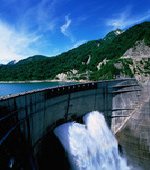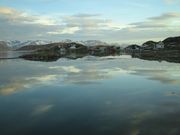 Optimisation for Sustainable Water Resources Management
Optimisation for Sustainable Water Resources Management
The overall aim of OPTIMA is to develop, implement, test, critically
evaluate, and exploit an innovative, scientifically rigorous yet practical
approach to water resources management, in close cooperation with local and
regional stakeholders, intended to increase efficiencies and to reconcile
conflicting demands based on the European Water Framework Directive
(2000/60/EC). The approach equally considers economic efficiency,
environmental compatibility, and social equity as the pillars of sustainable
development. The project realises both the importance if not dominance of
the socio-political and economic aspects, but also the importance of a
reliable, consistent, and shared information basis for the policy and
decision making process. Empowerment through scientifically based but policy
relevant information is a key concept.
| Project number | INCO-CT-2004-509091 | ||
|---|---|---|---|
| Subject(s) | FINANCE-ECONOMY , POLICY-WATER POLICY AND WATER MANAGEMENT | ||
| Acronym | OPTIMA | ||
| Geographical coverage | Turkey, Lebanon, Jordan, Palestine, Tunisia, Morocco, Cyprus, Malta, Italy, Greece, Austria | ||
| Budget (in €) | n/a | ||
| Programme | INCO-MPC | ||
| Web site | http://www.ess.co.at/OPTIMA/ | ||
| Objectives | Water is a key resource in the Mediterranean region, and efficient use and
allocation are paramount to sustainable development, in particular in the
coastal zone of the South and East, undergoing fast economic development,
land use and demographic change.
The overall aim of OPTIMA is to develop, implement, test, critically evaluate, and exploit an innovative, scientifically rigorous yet practical approach to water resources management, in close cooperation with local and regional stakeholders, intended to increase efficiencies and to reconcile conflicting demands based on the European Water Framework Directive (2000/60/EC). The approach equally considers economic efficiency, environmental compatibility, and social equity as the pillars of sustainable development. The project realises both the importance if not dominance of the socio-political and economic aspects, but also the importance of a reliable, consistent, and shared information basis for the policy and decision making process. Empowerment through scientifically based but policy relevant information is a key concept (AG 21, Chapter 40). The proposed methodology will extend classical optimisation and mathematical programming methodology in several respects, by:
|
||
| Results | Potential ImpactsContributions to standardsOne of the areas of work that may contribute to standards is in the land use and land cover analysis from remote sensing data. While this will primarily based on existing examples like CORINE, the specific use for the estimation of land cover specific water demand will have to be based on a common set of standards across the case studies and the partners primarily providing remote sensing data and analysis (Lebanon, Tunisia).While the project will use European and international standards, e.g., on drinking water quality, wherever applicable, it will not directly contribute to the definition or setting of standards other than as described above. Contribution to policy developmentsWater is clearly a key resource in the Mediterranean region, and the coastal zone in particular. Every contribution to a better, more efficient management will have a positive impact on the region and its potential for sustainable development.The proposed project is expected to have impacts in the Mediterranean region by:
Within this framework, expected impacts will relate directly to EU policy regarding the management of water resources by providing powerful tools for resource management policy analysis that links the approaches described in the EU Water Framework Directive, and the Euro-Mediterranean partnership with national water policies in Turkey, Cyprus, Lebanon, Jordan, Palestine, Tunisia, Malta and Morocco. The Directive 2000/60/EC of the European Parliament and of the Council of 23 October 2000 (WFD) establishes a framework for Community action in the field of water policy. This directive is primarily concerned with the quality of water resources and does not deal with the management of scarce water resources directly. However, the control regime for water quantity regulation that is introduced will be carefully assessed for its applicability in the study areas. In particular, the principles of full cost recovery and polluter pays that are established by this directive will be policy reference points for evaluating economic efficiency and technical feasibility in water management scenarios. The measures that are a requirement under Article 11 describe controls for the abstraction of groundwater and also include measures to promote the efficient and sustainable use of water. The OPTIMA project focuses on water scarce countries will result in a set of best practice guidelines that will contribute to developing European know how in designing sustainable solutions. The Euro-Mediterranean Conference on water management held in Marseilles 25th and 26 of November 1996, the Declaration of the Euro-Mediterranean Ministerial Conference on local water management Turin, 18-19 October 1999, and the resulting Turin Action Plan are the cornerstone documents that describe European policy for water resources in the Mediterranean, and will form a strong basis for analytic work. Innovative and efficient tools and an approach, forming a comprehensive integrated decision support system for the analysis and operational management of complex natural resources systems implementing concepts of applied systems analysis are the expected product: emphasis on practical implementation through the careful screening of alternatives, consideration of the institutional framework, and the direct involvement of stake holders in the decision making process are designed to maximize the impact of project results. To that end, the project directly involves and addresses local and regional government as well as institutions involved in the water sector, including private industry. In addition, it involves elements of the civic society such as NGOs as the ultimate end users or end user representatives of water resources management policies for sustainable development as a balance to purely economic considerations market forces as major controlling element in development and any sustainable resource management strategy. The efficient management of scarce water resources requires a balanced consideration of numerous aspects including environmental, techno-economic, and socio-political aspects. The complexity of the problem, the large number of possible measures and their combinations, nonlinearities and uncertainties make intuitive solutions impossible, so that formal methods of decision support based on optimisation techniques are necessary for the design of successful, efficient solutions. The project is expected to contribute to these major elements of water resources management:
An alternative is the introduction of domain specific heuristics in a multi-tiered approach, using rule-based expert systems, and genetic algorithms, which can make the search much more efficient than traditional methods. Iterating between different levels of aggregation and representation, evolutionary strategies and local stochastic gradient search, a screening level approach and the use of evolutionary concepts of good enough rather than optimal can lead to efficient solutions even for very complex and large-scale problems. This innovative approach to the optimisation of complex, non-linear, distributed and dynamic systems is embedded in a framework of interactive, participatory decision support based on a secondary layer of discrete multi-criteria optimisation. Using a reference point approach to simplify the expression of preferences and trade-offs, this combined method supports interactive, exploratory use and easy integration in the policy making process. For the OPTIMA project this means the smooth integration of advanced quantitative optimisation tools into the socio-political, economic and environmental framework of regional development planning and public policy with its uncertainties, qualitative criteria, and conflicting objectives. The main innovative elements that will contribute to the impacts of the project include:
|
||
| Period | [01/01/2004 - 01/01/2007] | ||
 you are not logged in
you are not logged in





